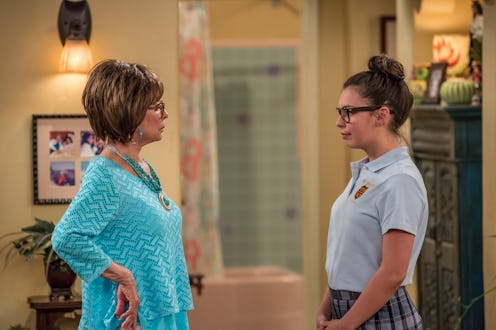Life
Elena Alvarez On ‘One Day At A Time’ Showed Queer Latinx Girls Like Me It Was OK To Take Up Space

Growing up, I never felt like my culture was something I could claim. Despite growing up in a predominantly Latinx neighborhood in New York City with two proud parents of Puerto Rican and Cuban ancestry, everything around me told me I didn’t fit. I was teased by other Latinx kids at school because I didn’t grow up speaking Spanish — instead, I was accused of “speaking like a white girl.” While I hailed from the same island as popular icons of the time such as Jennifer Lopez or Ricky Martin, I looked nothing like them with my impossibly stubborn poof of curly hair and chubby cheeks. When I looked elsewhere for representation in media, my people were praised for our food, our dance moves, and our appearance, but never for our bravery or intelligence. I felt like the odd girl out of a culture that I was supposed to belong to but wanted nothing to do with me, a quiet, queer girl with no rhythm who held a book to her chest as her suit of armor.
Fast forward to 2017 when I was introduced to Netflix’s now-cancelled series, One Day at a Time. The optics of the cast, while decidedly new to the mainstream television screen, perfectly portrayed the modern family — a Cuban-American single mother raising her preteen son and teenage daughter with the help of her mother and landlord turned family friend. In this hilarious, poignant 30-minute sitcom, the audience bears witness to the nuanced way in which it’s possible to seamlessly interweave topics such as mental health, gender identity, sexuality, racism, immigration, and more through the lens of a Latinx family. It immediately became apparent that this show was breaking barriers and creating conversations that may have never existed across generations of Latinx family members.
As soon as I met 14-year-old Elena Maria Alvarez (played by Colombian breakout actress Isabella Gomez), I immediately felt a sense of deja vu. From her thick glasses and disheveled Catholic school uniform to the way she tirelessly fought for what she believed in and challenged her family to follow suit, it felt as if I was watching my own coming of age experience being told for the world to see.
But there was one thing about Elena that stood out: she had a fearlessness and innate self-confidence that I lacked growing up. While there were times in which she doubted herself, especially as she came into her sexuality as a proud lesbian woman, it seemed as if nothing could stop her from being true to herself. In a culture where women are told “calladita te ves mas bonita” (“you look better with your mouth shut”) Elena stormed the small screen like a hurricane tearing down any stereotype or outdated cultural norm that tried to box her in. In the face of constant conflict with her old-school grandmother and being temporarily disowned by her own father, Elena held true to her personal values knowing that she wasn’t the one who needed to change — instead, she invited the ones she loved to grow alongside her.
Last week, the internet came together in collective disbelief when Netflix announced they would not be renewing One Day at a Time. In a matter of three seasons on the streaming platform, the show had moved so many people with the way in which it broke down what it truly meant to be a family. We bore witness to emotional tweets and videos from cast and crew members who thanked the fans for rallying behind the show with such genuine devotion and adoration, including Gomez, who to the surprise of no one may have been one of the loudest voices of the bunch.
“To my sweet Elena Alvarez: you are the most extraordinary, badass little lady I’ve ever known and I hope I’m even just half of the woman that you are when I grow up,” she wrote in an Instagram caption. “Playing you has made me a much more empathetic, informed human … Your passion for life and for improving the world and becoming the best version of yourself you can possibly be will stay with me forever. Being your vessel has been the greatest privilege and accomplishment of my life.”
As fans of the show play the waiting game to see if ODAAT might be picked up by another network, I honor the spirit of Elena Alvarez for giving brilliant, opinionated queer girls who have ever questioned their place in their Latinidad the representation we never had before. Thank you, Elena, for seeing us, and giving us a voice.